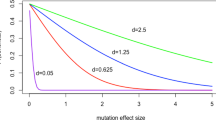Abstract
This paper attempts to update the 18th century concept of progress by an evolutionary theoretical framework, while replying to some of the contemporary critiques. Progress, understood as increase in fitness (or its proxy, quality of life) necessarily accompanies evolution by natural selection. In socio-cultural evolution, this mechanism is reinforced by growth of knowledge and virtuous cycles, but can be accompanied by negative side-effects such as overshooting and parasitism. The most pressing of the contemporary side-effects, such as pollution and the increased pace of life, are discussed, but it is concluded that they can be tackled without really endangering global progress. The anxiety that they engender is unfortunately amplified by a “bad news” bias in the media, leading to an inappropriately pessimistic view of the situation by the public.
Similar content being viewed by others
REFERENCES
Aerts, D., L. Apostel, B. De Moor, S. Hellemans, E. Maex, H. Van Belle and J. Van Der Veken: 1994, Worldviews: From Fragmentation to Integration, (VUB Press, Brussels).
Ames, B.N. and L.S. Gold: 1997, 'Environmental pollution, pesticides, and the prevention of cancer: Misconceptions', FASEB Journal 11, pp. 1041–1052.
Bernheim J.: 1999b, 'The cognitive revolution and 21st century enlightenment: Towards a progressive world view', in D. Aerts, S. Gutwirth, S. Smets and L. Van Langenhove (eds.), Science, Technology and Social Change (Kluwer Academic Press, Dordrecht).
Brodie R.: 1995, Virus of the Mind: The New Science of the Meme (Integral Press).
Campbell D.T.: 1974, 'Evolutionary epistemology', in P.A. Schilpp (ed.), The Philosophy of Karl Popper (Open Court Publish., La Salle, Ill.), pp. 413–463.
Cullen B.: 1999, 'Parasite ecology and the evolution of religion', in F. Heylighen, J. Bollen and A. Riegler (eds.), The Evolution of Complexity (Kluwer, Dordrecht).
Dawkins R.: 1976, The Selfish Gene (Oxford University Press, New York).
Eckersley R.: 2000,'The state and fate of nations: implications of subjective measures of personal and social quality of life', Social Indicators Research (in press).
Ehrlich P.R.: 1976, The Population Bomb (Amereon Ltd). Elchardus M.: (ed.) 1998, Wantrouwen en Onbehagen (Distrust and Unease), (VUB Press, Brussels).
Fisher R.A.: 1930, The Genetical Theory of Natural Selection (Clarendon Press, Oxford).
Geyer R.F.: 1992, 'Alienation in community and society: effects of increasing environmental complexity', Kybernetes 21(2), pp. 33–49.
Gould S.J.: 1996, Full House: The Spread of Excellence from Plato to Darwin (Harmony Books).
Heylighen F.: 1992a, 'A cognitive-systemic reconstruction of Maslow's theory of self-actualization', Behavioral Science 37, pp. 39–58.
Heylighen F.: 1992b, 'Principles of systems and cybernetics: An evolutionary perspective', in R. Trappl (ed.), Cybernetics and Systems '92(World Science, Singapore), pp. 3–10.
Heylighen F.: 1997a, 'Objective, subjective and intersubjective selectors of knowledge', Evolution and Cognition 3: 1, pp. 63–67.
Heylighen F.: 1997b, 'The economy as a distributed, learning control system,' Communication and Cognition-AI 13, nos. 2-3, pp. 207–224.
Heylighen F.: 1999, 'The growth of structural and functional complexity during evolution', in F. Heylighen, J. Bollen and A. Riegler (eds.), The Evolution of Complexity (Kluwer, Dordrecht).
Heylighen F. and J. Bernheim: 2000, 'Global Progress I: empirical evidence for increasing quality of life', Journal of Happiness Studies (this issue).
Heylighen F. and J. Bollen: 1996, 'The world-wide web as a super-brain: From metaphor to model', in R. Trappl (ed.), Cybernetics and Systems '96 (Austrian Society for Cybernetics) pp. 917–922.
Holmes T. and R. Rahe: 1967, 'Social readjustment rating scale', Journal of Psychosomatic Research II, pp. 214.
Ito, T.A., J.T. Larsen and J.T. Cacioppo: 1998, 'Negative information weighs more heavily on the brain: The negativity bias in evaluate categorizations', Journal of Personality and Social Psychology 75(4), pp. 887.
Kelling G. and C. Coles: 1996, Fixing BrokenWindows: Restoring Order and Reducing Crime in Our Communities (Free Press).
Moffat A.S.: 1997, 'Resurgent forests can be greenhouse gas sponges', Science (July 18) 277(5324), pp. 315.
Moore T.G.: 1998, Climate of Fear: WhyWe Shouldn'tWorry about GlobalWarming (Cato Institute).
Nye J.S, and D. Zelikow et al. (eds.): 1997, Why People Don't Trust Government, (Harvard University Press, Cambridge MA).
Peter, L. and R. Hull: 1969, The Peter Principle (Morrow, New York).
Reuters: 1996, Dying for Information? An Investigation into the Effects of Information Overload in the UK and Worldwide (Reuters Business Information report).
Russell, P.: 1995, The Global Brain Awakens: Our Next Evolutionary Leap (Miles River Press).
Shenk D.: 1997, Data Smog: Surviving the Information Glut (Harper, San Francisco).
Simon J.L. (ed.): 1995, The State of Humanity (Blackwell, Oxford).
Simon J.L.: 1999, Hoodwinking the Nation (Transaction Publishers).
Stock G.: 1993, Metaman: The Merging of Humans and Machines into a Global Superorganism (Simon and Schuster, New York).
Toffler A.: 1970, Future Shock (Random House, New York).
Author information
Authors and Affiliations
Corresponding author
Rights and permissions
About this article
Cite this article
Heylighen, F., Bernheim, J. Global Progress II: Evolutionary Mechanisms and their Side-effects. Journal of Happiness Studies 1, 351–374 (2000). https://doi.org/10.1023/A:1010004130711
Issue Date:
DOI: https://doi.org/10.1023/A:1010004130711




